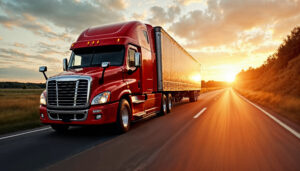The future of the trucking industry is being shaped by rapid advancements in technology, changing regulations, and shifting market demands. From electric and autonomous trucks to smart logistics and sustainability initiatives, the industry is entering a transformative era. As global transportation needs grow, understanding where trucking is headed is essential for fleet owners, drivers, and logistics professionals alike.

-
Rise of Electric and Autonomous Trucks In future of the Trucking Industry
One of the most groundbreaking developments in the trucking industry is the emergence of electric and autonomous vehicles. Companies like Tesla, Volvo, and Daimler are leading the charge with electric trucks that promise zero emissions and reduced operational costs. At the same time, autonomous trucking is moving closer to reality, offering solutions to driver shortages and improving road safety.
Benefits:
-
Lower fuel and maintenance costs
-
Reduced greenhouse gas emissions
-
24/7 delivery potential with autonomous tech
Challenges:
-
High initial investment
-
Infrastructure needs (charging stations, smart roads)
-
Regulatory and safety concerns
2. Smart Logistics and Digitalization
The use of telematics, IoT devices, and AI-powered applications for fleet tracking makes digital transformation receive telematics, IoT sensors, and AI software real-time tracking of fleets, predictive maintenance, and even snap-on route optimization. Download. uploaded, done.
Key Innovations:
Tracking delivery of goods in real-time
Intelligent transportation system for dispatching
Automatic upload, documentation as well as unwaited verification and compliance of the laws of the company
As an example of what other companies encounter while digitizing processes in the company, I would like to mention that modern companies after shipment do not upload cargo documents and upload them registered letter to head office law department. Of this approach, digital logistics augment business process redirection by improving the business activities roles in the customer chains. Now shipping companies do not duplicate information but instead fill document upload places and describe submitted files and uploaded materials placed in encoded caches digitally accompanied by unified register numbers.
3. Emphasis on Eco-Sustainability and Environmentally Friendly Practices in future of the trucking industry
Organizations and governing bodies are adopting measures to protect the environment. In line with this, the trucking industry is embracing eco-friendly practices such as compressed natural gas (CNG) and hydrogen fuel, energy-efficient tires, and aerodynamic truck designs.
Future Considerations:
Government subsidies for environment-friendly fleets
Carbon-neutral objectives for freight forwarders
Collaboration with renewable energy companies.
4. Change in Workforce and Ways to Tackle Driver Shortages
Even with increasing automation, professional drivers are still vital to the trucking ecosystem. Aging workforce and driver shortages is becoming a notable issue in the sector.
Future Plans:
Enhanced recruitment and training initiatives
Enhanced pay and employment conditions.
Technologies that are semi-autonomous to aid drivers.
In the long term, the responsibilities of drivers may transform from operating vehicles to monitoring and managing automated systems.
5. Flexibility and Resilience within the Supply Chain
As we learned from the pandemic, maintaining flexibility in the supply chain is essential. The trucking sector is implementing more adaptable solutions as well as digital systems that minimize disruption and route diversification.
Novelties:
Focused networks for distribution
Predictive AI for identifying potential supply chain threats
Freight matching services that offer real-time demand-based logistics.
6. Changes in Policy and Infrastructure
Policymakers are adopting a futuristic approach. Autonomous and electric trucks will require modern infrastructure, including smart highways alongside 5G networks.
Anticipations:
Increased enforcement on compliance of emission regulations
Policies on digital safety and compliance will be on enforcement
Funding towards the electrification of highways.
Technology and Automation:
Artificial Intelligence (AI): The transport sector is quick to adopt new technologies, with automatically guided vehicles transforming trucking and logistics.
Route Optimization: AI-powered algorithms calculate the best possible routes for each vehicle by taking live traffic, weather conditions, and other relevant data into account, thus saving time, fuel, and money.
Predictive Maintenance: Sensors installed in the vehicle make constant monitoring of the truck fleet’s health possible. AI tools can predict vehicle-related problems 3ffer8 of 2911yggrze
Intelligent Load Matching: With more precision than before, machine learning techniques allow AI to make quicker and more accurate decisions on pairing unutilized trucks with freight based on its nature, driver wishes, truck size, and other relevant factors.
Supply Chain Optimization: With AI, it is possible to forecast customer demand while analysing the stock available and the routes for delivery, thus improving the overall supply chain.
Conclusion
We have an exciting outlook for the trucking industry in terms of innovation, efficiency, and sustainability. There are challenges in future of trucking industry to overcome such as infrastructure readiness and regulatory hurdles, but the trucking industry is sure to innovate. Companies that invest in technology while also prioritizing environmental responsibility will be at the forefront of logistics and transportation.
The industry is not just focused on the movement of goods; the trucking industry is now shaping the future of global business.

